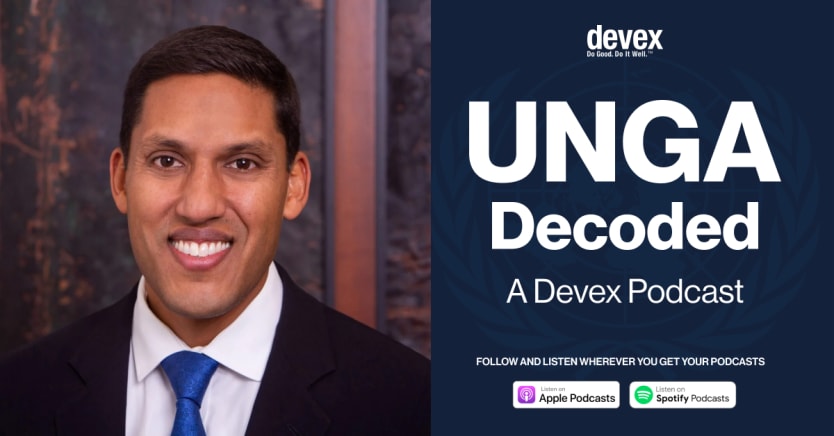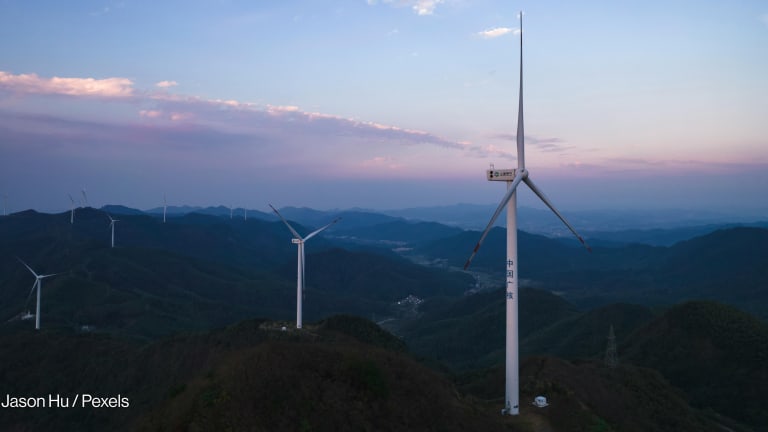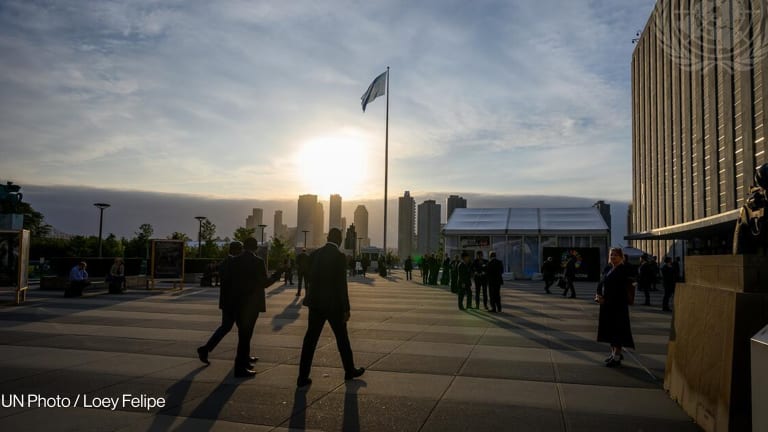Listen to "Raj Shah on unlocking climate leadership" on Spreaker.
The president of The Rockefeller Foundation says the World Bank and other financial institutions must do more to rise to the challenges of economic and climate crises that threaten to unwind global development gains. Michael Igoe sits down with Rajiv Shah to talk about this, and how the foundation’s historical ties to oil money have affected its present-day focus on climate transitions.
Before becoming president of The Rockefeller Foundation, Raj Shah served as U. S. Agency for International Development administrator under President Obama, as chief scientist at the United States Department of Agriculture, and in a range of leadership roles at the Bill & Melinda Gates Foundation.
Subscribe on Apple podcasts, Spotify, Soundcloud, or YouTube, or search “Devex” in your favorite podcast app.
TRANSCRIPT
Michael Igoe
Welcome to “UNGA Decoded.” I'm Michael Igoe, Senior Reporter at Devex. For the next couple of weeks, my colleagues and I are going to bring you inside the biggest global development gathering of the year. Skip the travel, the traffic, and the security lines, and join us for candid conversations with people at the leading edge of global development, global health, and humanitarian assistance. This is “UNGA Decoded.”
Raj Shah
It's extremely difficult to be optimistic about the next decade, unless we do things very differently.
Michael Igoe
If you've been following the news from UNGA this week, you've likely seen that the President of the World Bank David Malpass is taking a lot of heat for repeatedly dodging a question about whether he believes in the scientific consensus that humans are responsible for dangerous climate change. Malpass’ hesitancy to give a clear answer — at one point he said, quote, “I'm not a scientist” — is leading many climate advocates to call for his removal. Before Malpass’ now infamous exchange, I sat down with Rajiv Shah, the president of the Rockefeller Foundation, who has put climate change at the center of his organization's work. In our conversation, Raj laid out a case for thinking differently, and a lot more urgently about the role of multilateral development banks like the World Bank, and other international financial institutions, which he said are just not keeping pace with the crises threatening to unwind development progress around the world. Raj also shared with me what it means for a foundation, whose historic wealth was built on fossil fuels, to be a leader in the effort to move away from them.
Michael Igoe
It's great to see you, Raj, thanks so much for doing this.
Raj Shah
It's great to be with you.
Michael Igoe
I was thinking a little bit about my own career, vis-a-vis yours. And I started at Devex in the spring of 2013 as a reporter, and it was really, I was closely watching USAID at the time. And it was really through watching the things that you were focused on that I really came to learn about development and what the core issues were and what some of the big debates in the sector were. So for me, this is a sort of a return back to the beginning, the origin story, and nice to catch up with you.
Raj Shah
Well, thank you. And you know, Devex is really the only development-focused platform in the United States along these lines. And I'm so grateful that you're populated by people who, like yourself, really care, because at the end of the day, you know, that's what motivates all of us to get out of bed every morning and do the best we can to make life better for others around the world.
Michael Igoe
To come and sit in a — we're in a glass — they’ve put us in a glass cube here, and it's about 35 degrees, so apologies for that. But I appreciate that. And I've been really excited to have this conversation with you. Because I know that you've been focused on, you've kept a pretty laser focus on some of the same issues. Since I started following your work back at USAID, even then, energy poverty through power Africa was a huge priority. And I know that you've kept climate change really at the center of the Rockefeller Foundation's work now that you're president there. What is it about energy that strikes you as so fundamental? Why have you made that one of the things that you really sort of build your development vision around?
Raj Shah
Well — and I'll come back to this in a moment — it's basically because access to energy is what allows human beings to gain significant leaps and bounds in their own labor productivity. And at a very basic level, if you cannot be more productive over time, you cannot lift yourself and your community out of poverty, extreme poverty, or being stuck in very low-income, informal economic settings. And as we looked all around the world in probably three different roles for me, I observed that it is next to impossible to help a family lift themselves up, if they simply can't turn the lights on, if they can't go get a job in a place that's using power tools and power equipment, if they don't have the ability to use electricity for post-harvest processing of their agricultural output, and if their children can't study at night or cannot log in and participate in a
global digital economy. And so, you know, that's really the number one constraint to growth and development in most places around the world, and deserves far greater focus and interest.
Michael Igoe
And you mentioned that you've now seen this from several different perspectives and sort of tackled the problem from different angles. How do you think about the role of foundations here, and what's different about leading a foundation in this work than say, leading a government agency like USAID?
Raj Shah
Honestly, the biggest difference is foundations get to really choose the issues they work on and take risks, and serve as society’s risk capital, to try bold, innovative new things and, and to be able to fail, or succeed. And when you succeed, you can bring lots of other partners to the task. When you fail, you move on quickly to the next thing. And, and that's okay. And we need more of that in global development. We need more of that right now. The reason we need more of that right now is we're in the midst of really two extraordinary crises that I don't think most people understand. The first is, with the downward projections of growth in the wealthier economies, and in developing and emerging economies, you basically no longer have the kind of super growth in developing countries that creates economic convergence and lifts up people through opportunity and industry. And that means we're in the process of unwinding two decades of progress against the Sustainable Development Goals. And right now, institutions and leaders are not yet coming together to address that head on. The second crisis is climate. And what's less understood is that the impacts of climate change — forget about the sources — the impacts of climate change, are far more acute and disastrous in developing and emerging economies. And the immediate downward pressure on food production, on energy access, upward pressure on migration and displacement, upward pressure on the number of communities that are running out of water, is just extraordinary. It's an extraordinary challenge. And when you put the two together, it's extremely difficult to be optimistic about the next decade, unless we do things very differently.
Michael Igoe
So talk to me about that piece. What is the difference? What isn't happening that you think needs to be? And are you seeing a global community, a collection of institutions that are approaching a breaking point or a breakthrough? What do you see in the balance there?
Raj Shah
Well, it's there 60% of developing countries are experiencing debt distress, more than 40 of them are likely to flip into an all out debt crisis. If you look across the number of developing countries, the predictions around deep food insecurity and fuel price crises, causing political instability, is greater now than it was in 2007. And in 2007, if you looked forward about 18 months, there were 48 different episodes of serious instability, and crisis. And that's happening on top of climate change, which, as you know, a third of Pakistan is underwater. And, you know, hundreds of thousands of people are right on the brink. So yes, now is the time to really think differently about what we should do. In our view, there are two big categories of doing things differently. One is dealing with macro economic recovery issues. We need some form of debt relief, we need to rethink debt sustainability, so that it's not tied to short term IMF programs but tied to long term investment and human development. We frankly need to accelerate the innovation, ingenuity, and expenditure from our multilateral development banks and institutions that exist for this purpose, but operate in a way that is tied more closely to the sort of 70s and 80s than it is to the way other similar institutions might be able to do things today. And that's a fault not just of the institutions, actually not of the institutions, it is a challenge of their shareholders and the political leadership that can make things possible if they choose to do so. So that's on the macro level. On the micro level, we need these big public-private partnerships around energy, around food, around health. There's no reason there should be another pandemic. It's not necessary. If COVID-19 didn't teach us how to come together and get surveillance and prediction and prevention right, nothing is going to. The tools are all there. It's a matter of stitching it together. We know how to help small-scale farmers improve their food productivity and their resilience to the kind of price shocks that have been created by the Ukraine-Russia conflict. There's no need for that to push another 100 million people back into hunger and starvation. But that's what's happening right now. And then our big effort is around this effort called the Global Energy Alliance for People and Planet where we've mobilized $11 billion in a global partnership to help bring renewable electrification to a billion people who still effectively live in the dark. And these are the kinds of things that are achievable. But they require partnership, public-private, focus on results, and a long-term time horizon and commitment. And so that's what we try to do.

Michael Igoe
So there's both a reform piece, which sounds from what you've said, like you feel that that is principally focused within the multilateral development banks and international financial institutions. And then there's kind of a bucket of action pieces as well, which it sounds like a foundation like Rockefeller is able to play a convening role in spearheading, is that sort of how you would think about it?
Raj Shah
Yeah, that's how I think about it, we get to be a part of working on reform efforts as well.
Michael Igoe
How does that happen? How are you engaged with the MDBs, for example, and saying, “Hey, let's get more capital out there?”
Raj Shah
Well, we support innovation across the board. I think, at this week's event in New York, they'll launch the International Finance Facility for Education that's modeled and updated on something called the International Finance Facility for Immunization, which was created many years ago. Those are examples of innovations that mobilize billions of dollars for a specific issue and use guarantees and credit and tapping capital markets in novel ways to do so. We are working with other partners on carbon credit facilities that would help energy projects that sell into carbon credit markets, voluntary carbon credit markets, to bring more capital to those efforts. So we can be part of the innovation frontier in that space. But you're right, to really transform the Bretton Woods architecture, to really reimagine global cooperation on the macro economy, that is the job of heads of state, finance ministers, shareholders of our existing institutions, and a different kind of global cooperation with a different sense of urgency and purpose, which we think is really needed right now.
Michael Igoe
You've mentioned a few things that are either being announced or happening this week. Is there anything that you're particularly keeping your eye on in the UNGA limelight? I know that UNGA has really expanded beyond what happens at the U.N. headquarters. Here we are sitting at CGI, for example. But is there anything that — I mean, you live here, is this a normal week for you with just more meetings?
Raj Shah
No, it's not a normal week. I mean, look, it’s leaders coming together with some sense of how are we performing against the Sustainable Development Goals and what obligations do we have to each other to improve our performance? I get frustrated by the fact that sometimes there's too much happy talk about small-scale, pilot-type projects, without enough awareness of the fact that without some larger interventions we are systematically unwinding a decade or two of human development progress. And I don't think people recognize that that is what the next 10 years looks like if we don't take bolder steps now. But this is an important place to come to talk about what those bolder steps are. So we're a part of all those things.
Michael Igoe
I know that one thing that you've been leading at Rockefeller is a delicate and difficult look back at the foundation's history and founding, and I'm speaking particularly about some of the views held by the founders of the foundation. And specifically, associations with eugenics is one that I know that you've tried to shine a spotlight on through something called the Anti-Eugenics Project and other initiatives. It occurred to me that the elephant in the room here might be that a lot of the Rockefeller wealth also came from fossil fuels. Is that something that you keep in mind in your leadership and pursuit of climate transitions?
Raj Shah
Absolutely. Look, we are all stewards of the institutions and the roles we get to be a part of, right? So our job, and so my job as the steward of what I think is one of the more important moral leadership platforms for the world is to be honest, open and transparent about how our history connects to the present. And so we have to study and own up and recognize points of view that are not appropriate for moral leadership in this day and age. One of them is where our wealth comes from, right? So we, as a foundation, announced a divestment from fossil fuels. I think it's particularly notable that an institution endowed on the wealth created by Standard Oil is saying we have divested of our fossil fuel assets and will continue to not invest in those assets. We have announced a major refocusing of our efforts on climate and climate vulnerability around the world. And I think that's notable too, because we know that climate change is caused by man. It's caused by development, and it's caused in large part by fossil fuel-based development over 100, 150 years. And it's why our biggest single effort is the Global Energy Alliance for People and Planet, an $11 billion partnership to reach a billion people, exclusively with renewable electrification. It turns out now, that's not a sacrifice. Actually, the technology, cost structure, the reality of building out mini-grids and metro grids and communities that are not grid connected, it's more cost efficient to do that using solar panels, new batteries, new smart metering technology, new off-site, AI-based battery management, energy management systems, all this new technology is coming together to allow the world to solve the problem of a billion people living in the dark in a way that doesn't require fossil fuels, and frankly, is better solved without the burning of fossil fuels. And so that's why we focus on it.
Michael Igoe
Well, Raj, thanks so much for stopping by. It's really nice to talk with you. Thanks for taking the time.
Raj Shah
Thank you for having me.
Michael Igoe
Thanks for listening to “UNGA Decoded.” We'll be bringing you more interviews from the U.N. General Assembly throughout the next week. If you enjoyed today's episode, please do share it with friends, family, and colleagues. And you can also leave us a rating or a review on Apple podcasts. If you've been to UNGA and have some thoughts, or if you just want to share some feedback on this episode, we'd love to hear from you. You can find us on social media @devex and @AlterIgoe.









